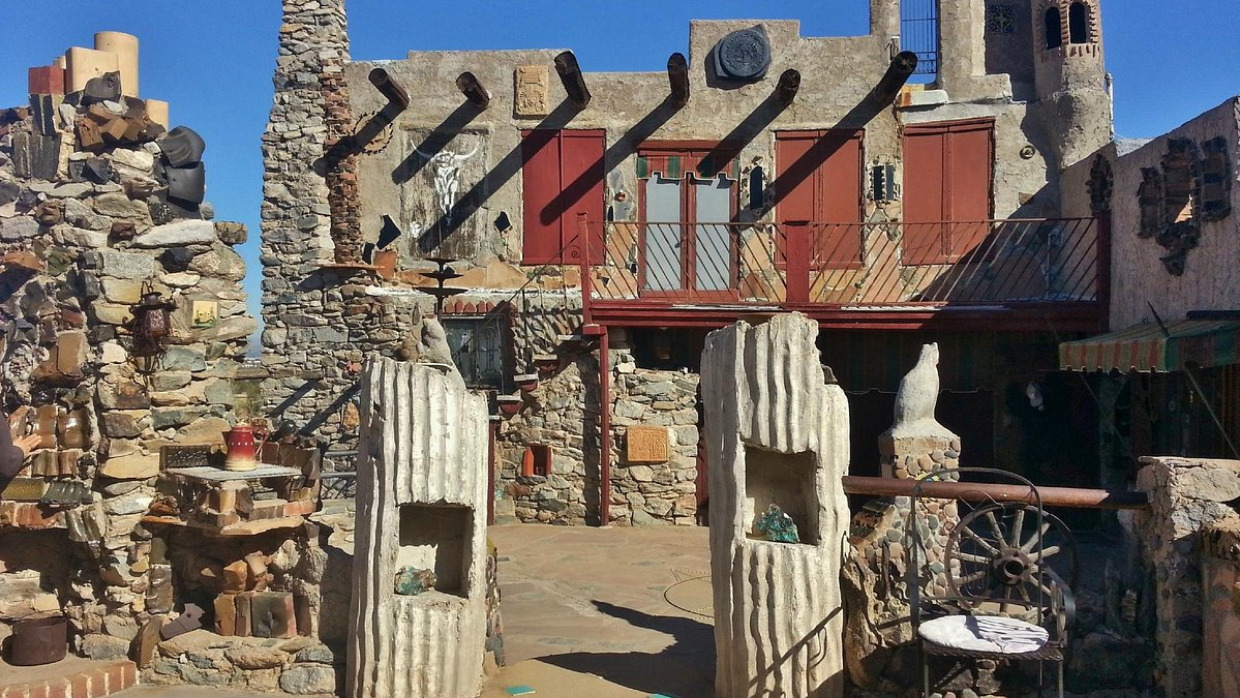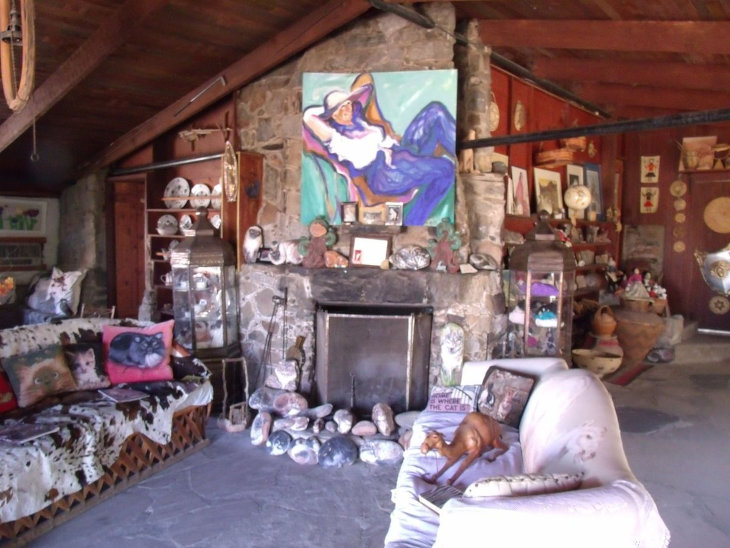 Vampire Weekend's Surprising Jewish Stories
Vampire Weekend's Surprising Jewish Stories


5 min read
Crippled by tuberculosis and cancer, Boyce Luther Gulley spent his final years building the strange castle – but not for himself.
One of the lesser-known landmarks in my hometown of Phoenix, Arizona, is a strange building known as Mystery Castle. Researching its past led me to one of the most bizarre, painful, and touching stories I’ve ever heard.
In 1929, Boyce Luther Gulley arrived in Phoenix from Seattle, suffering from tuberculosis. The move to Phoenix's therapeutic climate made sense, but what didn't make sense was how Gulley chose to spend his remaining days. He started collecting trash.
Old wagon wheels, automobile parts, glass bottles, you name it. At the same time, Gulley began making his own bricks and mortar. The reason for all this slowly became clear. With limited knowledge of construction and architecture, Gulley was building himself a castle with whatever material he could find.
Over the next 15 years, the structure would expand to include 18 rooms with 13 fireplaces, a small wedding chapel, and even a bar. Why was he doing this and for whom?
Over the next 15 years, the structure would expand to include 18 rooms with 13 fireplaces, a small wedding chapel, and even a bar.
Why was he doing this? And more mysteriously, for whom?
The answers would only arrive after Gulley's death in 1945 from cancer (the desert air successfully kept the tuberculosis at bay.) That year, two unexpected visitors arrived at the castle: Gulley's wife and daughter.
Mary Lou Gulley was now a young woman, but she still remembered her father's sudden disappearance during her childhood. He had vanished without explanation, and though he sent occasional letters, none told her why he'd left or where he'd gone. So when a telegram arrived with the news that Gulley had died in Phoenix, it seemed that she would never have an explanation for her father's strange behavior.

But a few days later, Mary Lou got the letter she'd been waiting for. Written just before his death, Gulley explained that he'd been terrified of infecting his family with tuberculosis or, at best, forcing them to watch his painful death. But he'd never forgotten them.
In particular, he remembered their family trips to the beach and how little Mary Lou would cry when the waves swept away her sandcastles. Gulley had told his daughter that he would someday build her a castle that couldn't be swept away, and he had finally fulfilled his promise.
When Mary Lou arrived, she discovered that her father had hidden notes and presents for her in secret compartments throughout the castle. The walls and floors were also adorned with beautiful mosaics and designs. In her very own Mystery Castle, Mary Lou slowly met the father that she'd never truly known. She lived there until her own death in 2010.
When I first read about this story, I couldn't help but think of Judaism’s own "mystery castle in the desert." The Mishkan, the Tabernacle the Jewish People built in the desert, functioned as the locus of Jewish worship until the building of the Temple in Jerusalem, and its elaborate design is detailed in the Torah. The Biblical commentaries explain that each of these details carried symbolic significance, strengthening the bond between the Jewish people and their Father.
But I think the shared essence of Gulley’s castle and the Tabernacle is deeper than symbolic architecture. Symbolism can be meaningful, even transformative, but it doesn’t encapsulate what Mary Lou felt when she stepped into her Mystery Castle or what the Jewish People experienced when they worshiped in their desert temple. Their shared essence revolves around the idea of family. More specifically, it is our inevitable sense of estrangement from family.
As comedian Jerry Seinfeld once observed, “There is no such thing as fun for the whole family.” In even the most loving and open-minded of homes, there are inevitably times when individuals feel misunderstood or left out. We expect this among strangers, even among friends, but it’s uniquely painful when our own flesh-and-blood somehow fail to be there for us. And if this is true in the best of cases, all the more so when there’s some dysfunction in the family.
Mary Lou spent her childhood believing that her father had simply left her. Not unlike the Jews enslaved in Egypt, she felt abandoned and forgotten. But all of that changed the moment she laid eyes on her father’s castle. Even before stepping inside, even before seeing its craftsmanship and contemplating its symbolism, Mary Lou received the castle’s most important message for her: “He never forgot about you. He loved you always.”
It’s a message that transformed a nation of slaves into a guiding light for humanity, and it continues to do so today. This week marks the beginning of the Hebrew month of Elul, which the sages interpret as an acronym for the verse in Song of Songs, “Ani l’dodi v’dodi li – I am for my beloved, and my beloved is for me.” It’s a time when the Jewish people seek to rebuild their connection with a Father who felt so absent during the historical tragedies and destruction of the Temple in Jerusalem that we recalled in the previous month of Av. It can begin by reflecting on our own personal “mystery castles” – those periods when we felt utterly alone, only to discover that something new and beautiful was being built for us.
The knowledge that we are always beloved and never forgotten can make all the difference in the world. For Mary Lou Gulley, it was enough to transform a desert trash castle into a home.

This interesting and unusual story is a good analogy to the Jewish experience in the face of silence from the Almighty. In fact, the Jew has faced anything but silence in centuries of diaspora and in the last decades, we've merited some solid evidence of rapt attention. But I liked considerting the elation of the daughter at realizing that, though she spend years feeling forgotten, her father's behavior was thought out and fully intended for her well-being. The day should come soon, when we all share that glorious feeling of being loved and cared for by Hashem.
Beautiful thought.
Thanks.